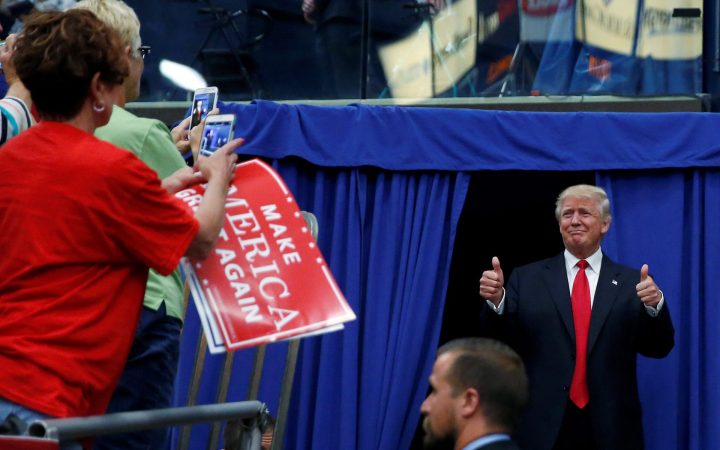We can confirm, without a shadow of doubt, that 2017 was the year of populist politicians. They used three main approaches: first they relentlessly attacked the integrity of traditional media, then they bypassed them, shunning them in favour of social networks, and finally they had populist messages. In 2017 alone, Donald Trump had nearly 330 million mentions on Twitter. That is a winning recipe!
By continually denouncing traditional media, Donald Trump has sown doubt among many Americans and elsewhere in the world. Also, “Fake News” is the term he uses most often on Twitter, 155 times since he has become president. He has cast doubt on many traditional media outlets, such as CNN and NBC (30 times each) and The New York Times (36 times). His verbal and written attacks on the media are snowballing, and also divert attention towards another media outlet that serves him well, Fox News. He has reposted favourable stories from this channel 153 times. Consequently, a recent study by the Poynter Institute shows that only 19% of Republican sympathizers have confidence in traditional media, compared to 74% among Democratic sympathizers. Trump has also explained, in a tweet that became famous, and was re-tweeted more than 33,000 times that day, why he uses social media so extensively: “Only the Fake News Media and Trump enemies want me to stop using Social Media (110 million people). Only way for me to get the truth out!”
Graphique Tweet de Trump
Between January 1 and October 31, 2017, the term populism was mentioned more than 3,000 times in Quebec print media alone. Donald Trump and Marine Le Pen were associated with these mentions in nearly 60% of the cases. The term is used in other contexts, often generically, to describe the style of a politician, or to identify certain sociopolitical issues of the moment. The term “populism” has becomes very fashionable, used in different contexts to describe realities which are often very different.
So, what exactly is populism? Media rarely take the time to explain. In Quebec, Influence counted at most 20 articles that attempt to explain it. * (see note at the end of this article)
The current strength of populist memes among politicians such as Donald Trump, Marine Le Pen or Geert Wilders means that populism is often associated with the right. But it is also active in other ideologies, such as socialism, liberalism, nationalism, etc. Historically, it has been resorted to by movements from all parts of the political spectrum, including Russian Communism in the Bolshevik revolution, fascism in the 1930s, and some Latin American revolutionary movements, as well as its recurrence in the United States.
Populism and Social Networks
Populism politicians seek to establish a privileged relationship with those they claim to represent and who constitute the people. In this respect, social networks are an extraordinary tool to propagate populist messages. They allow politicians to get access to users without going through the media filter. Normally the media select the messages of politicians and develop a critical perspective on them. Social media allow politicians to circumvent this filter and to communicate directly with the people who subscribe to the politician’s Facebook or Twitter feeds. They also allow direct feedback from the users. Messages can thus be adjusted in light of this feedback from sympathizers.
Populist politicians, particularly those of the right, benefit from a much greater visibility than that of more moderate politicians. Influence has calculated the number of Twitter mentions of several politicians from various countries where populist movements have enjoyed major political success.
The Prominence of Trump
Graphique 2
Donald Trump is unbeatable in this perspective. The American president has habituated us to a volley of morning tweets that often set the political agenda in the United States for that day. The numbers are impressive. He was mentioned nearly 330 million times on Twitter between January 1 and October 31, 2017. This is nearly 10 times greater than the number of mentions of Hillary Clinton, who, despite her retirement from active politics, remains one of the American political figures most often mentioned on Twitter.
The Prominence of Marine Le Pen
Graphique 3
In France, Marine Le Pen did not enjoy the same Twitter domination of the candidates in the last presidential elections. She was the subject of 11 million mentions, versus 15.5 million for Emmanuel Macron. However, when we examine the figures from the first round, we note that Marine Le Pen was dominant. She benefited from the greatest number of Twitter mentions during 12 of the 16 weeks in the period from the beginning of January, 2017, to the first-round vote on April 23, 2017. This despite the corruption scandal that dragged down the campaign of François Fillon, another presidential candidate.
The Prominence of Geert Wilders
Graphique 4
Less known here because he is Dutch, Geert Wilders is another populist who aroused strong feelings in 2017. As in the case of Trump, Wilders largely dominated the other candidates in the last elections in The Netherlands, in terms of Twitter coverage. He was mentioned five times more often than the Dutch Prime Minister, Mark Rutte, on this social network.
Certainly, the strong Twitter coverage of these three politicians arose in good part from the controversies they provoked. Their populism implied a break with the dominant political and media class, and their radical positions inflamed exchanges on social networks.
Tweets and Media
When we compare the political positioning of Trump, Le Pen and Wilders, we can see great similarities, notably in their abundant use of Twitter. However, their use of it is quite different.
Marine Le Pen’s Twitter account was used conventionally. It extended onto social media the communications efforts on the ground, whether participation in television shows, partisan rallies, or any other event where the politician was called to express herself in public. Most tweets posted promotional videos, clips from television shows, as well as many quotes. The systematic use of quotation marks to frame quotations showed clearly that these publications were excerpted from communications not intended for Twitter. They were a virtual extension of a dialogue conducted in person. Twitter nevertheless had a great influence on the media coverage of Marine Le Pen. The social network was quoted in about 9% of her coverage in the French print media.
Like Marine Le Pen, Donald Trump posts many photos and videos from events in which he participated. But the American president also, perhaps above all, used Twitter to present his point of view or attack his adversaries. The president has made us used to a morning volley of tweets that orient the political discussion of the day. About 25% of the coverage of the president in the American print media mentioned the social network. This is in sharp contrast to Marine Le Pen, since it is often the virtual positions of the president that orient the real, as shown by the importance of his tweets in political news in the United States.
Graphique 5 Word cloud
It thus becomes easier to adjust what you say based on who you are saying it to. By bypassing the media this way, the populist message becomes stronger. The rejection of the elite that it calls for becomes that much more credible, since it occurs outside the communications channels normally used by the elite. But this bypassing of the traditional media also forces the traditional media to become more interested in a message that goes viral on the web. In this sense, Twitter helps to force the hand of the media elite that Trump and Le Pen oppose. Twitter, favourite tool of populism? To ask the question is to answer it.
* It should be noted that this task is not easy. There is a reasonably strong consensus in the university milieu to underline the problematic nature of the word, which with its many and diverse uses becomes a cliché whose meaning is difficult to define. There is agreement, however, on some elements that Yascha Mounk, a political scientist at Harvard, described in a speech delivered in Montreal in September: “The populist claims to represent the will of the people against the traditional elites. He also claims that any resistance to this will, for example by journalists, judges, or institutions, is treason.” In other words, the populist politician refers in his messages to the people in general in opposition to an elite — political, cultural or economic — that is considered corrupt. For the populist politician, the people have a truth or a moral that the people in power have betrayed.
Another question then arises: what is “the people”? Certainly, the populist politician avoids answering this. He appeals incessantly to “the people” in his discourse, without considering its pluralism, or the diversity of its interests. Also, he totally rejects elites, without considering the good they bring to a society. Populism therefore divides society into two homogeneous categories: the people against the elites.


